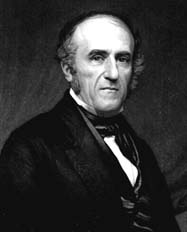Mark Hopkins
Mark Hopkins (1802-1887) was a graduate of Williams in the Class of 1824, which he entered from secondary school as a junior in 1822. Professor of moral and intellectual philosophy from 1830 to 1887 and president of the College from 1836 to 1872, he symbolizes in the history of American education the era of small country colleges, where poor boys, simple surroundings, and dedicated teachers created an environment friendly to liberal learning. A skilled teacher in the Socratic tradition, he has been immortalized by the aphorism attributed to one of his former students, James A. Garfield: "The ideal college is Mark Hopkins on one end of a log and a student on the other." A popular lecturer on moral and religious questions, for many years president of the American Board of Commissioners for Foreign Missions, he earned the love and respect of generations of Williams men by his qualities as a teacher and friend.
Mark Hopkins House and the Mark Hopkins Professor of Philosophy post are named after him, and Albert Hopkins was his brother.
Chronology
| 1802 | born February 4 in Stockbridge, MA the son of Archibald and Mary (Curtis) Hopkins. |
| 1815 | moves to Clinton, NY to live with Uncle Sewall Hopkins |
| 1816 | returns to Stockbridge |
| 1820 | moves to Mecklenburg, VA to teach |
| 1822 | enters Williams College as a Sophomore |
| 1824 | graduates from Williams College; gives valedictory oration; begins study of medicine in Pittsfield |
| 1825 | appointed tutor to the Junior Class at Williams College |
| 1827 | leaves Williams; moves to Pittsfield to continue medical studies; teaches at Berkshire gymnasium, Pittsfield |
| 1828 | teaches briefly at Mrs. Smith's School for Girls, NYC (?) |
| 1829 | receives M.D. |
| 1830 | moves to New York City with bother Harry; briefly practices medicine with Silas West; appointed professor of rhetoric and moral philosophy at Williams |
| 1832 | marries Mary Hubbell |
| 1833 | receives license to preach |
| 1836 | appointed president of Williams, the youngest man ever to hold office as college president in the United States; made professor of moral and intellectual philosophy; ordained as a Congregational minister |
| 1837 | receives doctor of Divinity from Dartmouth |
| 1847 | publishes Miscellaneous Essays and Discourses |
| 1841 | receives doctor of Divinity from Harvard College |
| 1843 | elected fellow of the University of the State of New York College of Physicians and Surgeons |
| 1846 | publishes Evidences of Christianity, Lectures before the Lowell Institute |
| 1848 | voted member of the board of Andover Theological Society |
| 1853 | elected Vice President of American Congregational Union |
| 1857 | elected President of American Board of Commissioners for Foreign Missions; elected Vice President of National Compen sated Emancipation Society; receives doctor of Laws from Regents of the State of New York |
| 1858 | gives welcoming address in Stockbridge to Cyrus W. Field, who had just laid the first Atlantic cable |
| 1861 | takes trip to Europe with wife |
| 1864 | elected resident member of MA Historical Society |
| 1868 | elected president of Academy of Metaphysical and Ethical Sciences |
| 1869 | publishes The Law of Love and Love as a Law |
| 1872 | resigns presidency of Williams, retains chair of philosophy |
| 1873 | publishes An Outline Study of Man |
| 1874 | publishes Of Strength and Beauty, Discussion for Young Men |
| 1882 | eldest daughter, Mary Louisa, dies |
| 1883 | declines presidency of National Temperance Society |
| 1886 | elected honorary member of American Institute of Civics; receives doctor of Laws from Harvard |
| 1887 | dies June 17 in Williamstown |
This page was derived from an article written for the Williams College Archives.
